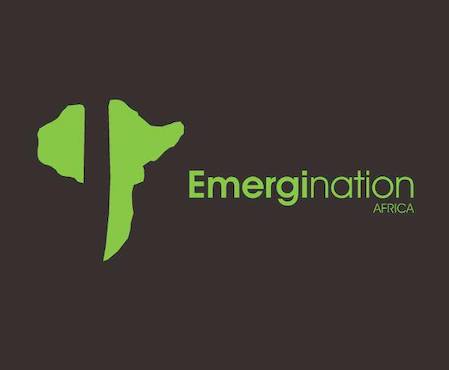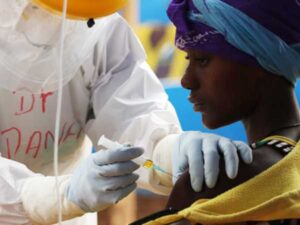Emergination Africa empowers learners and educators to turn their passion for entrepreneurship into valuable business ventures through training and accelerator programs.
Taku Machirori of Emergination Africa spoke with Jessica Kantor on April 14, 2023. Click here to read the full conversation with insights highlighted.
Jessica Kantor: Can you please introduce yourself, your organization, your role in the organization, and the problem that you’re addressing?
Taku Machirori: I am Taku Machirori. I am a Skoll scholar and the Founder of Emergination Africa. The problem we’re solving is youth unemployment in Zimbabwe currently and hopefully the rest of the continent.
We’re working to address this problem by creating a movement of entrepreneurship. We believe that entrepreneurs are in abundance on the continent, but there are not sufficient platforms that are harnessing this talent and potential and converting that talent to actually create economic opportunities, not only for itself but for others. We do that by training high school principals and senior teachers on venture building. They essentially then take our content, curriculum and tools into all of their classrooms across 200 schools in Zimbabwe. And so we impact about 50,000 young people. By the time these young people graduate, we take 10% of the product prototypes that would’ve been created by these young people, and we put them through an accelerator program where we give them seed grant funding. In addition to that, we give them local and global advisors, office space, laptops, cell phones, and internet data so that they can actually build these businesses up.
Jessica Kantor: Are you partnering with the government, or with the school district? How are you accessing the teachers to train them?
Taku Machirori: We have a five-year partnership with the Ministry of Primary and Secondary Education in Zimbabwe, which allows us to actually go directly into the schools and to also get approval from them in terms of the content and curriculum that we’re shaping and providing these educators themselves.
Jessica Kantor: How are you measuring success right now?
Taku Machirori: The way we’ve been looking at measuring success is on one front with our educators, trying to understand if their mindsets are actually changing. That’s done through visits to the classroom to understand if it’s really about the educator, because entrepreneurs learn very differently from everyone else. Understanding how they’re delivering the content, if it’s an engaging, exciting, facilitative experience, and measuring some of the projects that come out of those classrooms themselves. We measure those through a competition that we also run where we have business leaders that evaluate some of the ventures that are being pitched.
On the second end, we look at the ventures themselves and any problems they are solving from an SDG [Sustainable Development Goal] perspective. We also use some of the indicators from the SDGs and then go to those communities where those ventures have been built to see what the impact itself actually is. Those are the two ways we’re looking at the educators and we are looking at the learners that have created the ventures.
Jessica Kantor: Do you have any examples that illustrate the impact of your work?
Taku Machirori: Yes, we do. We have one venture from a rural part of Zimbabwe and what they realized is that many rural, smallholder farmers, had to shell sorghum and rapoko, small cereals with their fingers, with their hands. That took them close to four days to do and, in some cases, they would have their children come and assist them, which led to their children not being able to focus on school. So they came up with a solution, which was a solar-powered mobile shelling machine. They provide mobile shelling services for smallholder farmers so that they don’t have to use their hands and they can continue to grow these crops that are important for their diets.
They’ve taken it from four days to just an hour’s worth of work. And with the byproduct of that grain shelling, they create stock feed for livestock, for cows and chickens and pigs. They’ve covered close to 40 hectares and have worked with close to 50 farmers so far. We supported them in 2021 and they’re still a venture that’s still operating today.
Jessica Kantor: And so they had gone through your full program where they started out in school, they were trained in the classes, and then they had that idea?
Taku Machirori: Completely. Literally from the idea and the educator identifying that idea, nurturing that idea, then channeling it over to us so that we could start giving them the capital and the additional hands-on support that they needed, to now make that product and get it into the market.
Jessica Kantor: Do you have any teachable lessons that others could take from what you’ve done with your model?
Taku Machirori: One is definitely being patient, especially when it comes to the education sector. It’s a space where you definitely have to collaborate with the government, and the government is not going to overnight grant you the rights and access to go into all of their schools. It took us four years to actually achieve that. And we literally got our offices opposite the Ministry of Primary and Secondary Education so that we could go there daily and have the meetings that needed to be had and show our evidence. So I’d say patience is something that’s very important.
It’s also important to be willing to adapt and be agile with your theory of change, because what we were when we first started to what we are now is a completely different organization. I think that takes listening and understanding the problems from a systems’ lens and perspective, and being willing to start changing your theory of change, but always making sure you have that governing thought and purpose behind it.
Another actionable lesson is to just be human. I think sometimes when we think about impact measurement and a KPI [key performance indicator] and a number, we forget we’re actually just working with human beings. And human beings receive things very differently. They all have very unique experiences, journeys, backgrounds, minds and thoughts. They’re living organisms and we can’t box everyone into a KPI and because they’re not fitting that KPI, then there’s something wrong with them. No, they’re humans. So always take a human-centered approach to impact.
Jessica Kantor: What are some lessons that maybe you learned early on that others could learn from? You mentioned that you’re a very different organization now than you were before. What were some of those struggles that you faced and lessons that you learned from them other than what you just spoke about?
Taku Machirori: When we started, I was an undergrad, and one of the struggles we faced was that we were young and people didn’t take us seriously. A lot of the time when we talked to people in government or to people in corporations, it was like, “These young guys. What are you trying to achieve?” I believe in the power of young people, hence why we invest in 18 and 19 year olds and give them the responsibility in the platform.
I would say the lesson there is to start as young as possible. You don’t have to wait until you’re 30 or 40 to get a degree or have work experience. You can go and solve something that you have a lived experience in or that you just care about. I know some of my peers decided not to because they felt, “Oh, I need to do this first and get that first.” If you care about it enough, you’ll learn as much as you can just to get started even though you’re young.
Jessica Kantor: Is the organization currently facing any challenges or limitations that they haven’t yet been able to overcome?
Taku Machirori: For our organization in general, the challenge is we want to reach 2 million young people by 2027 and have 360 micro ventures created by these young people by then as well. The challenge is being able to scale that, and also, especially getting funding to allow us to do that, one. And two, being able to connect with people who are doing somewhat similar work and have managed to scale to that extent so that we can learn from their mistakes and understand how to build the right operating model and the like. The main thing is really how we should scale and what we can learn from others, as well as getting the right funding.
Jessica Kantor: You mentioned that you’re working to go larger in the region. What are you doing to advance that and work towards system level change?
Taku Machirori: One thing we’re doing is a lot of the solutions we’ve developed in terms of our programs have always come from seeing what the need is. We want young people to be entrepreneurs, but then you have to train the people that spend the most time with them, which is the teachers. We train the teachers, then we realize, well, the teachers are not being allowed to actually execute upon what we would want them to execute upon because the school principal doesn’t understand what we’re trying to do. Then we decided we need to train the school principal so that the school principal can create an entrepreneurial environment on the campus and empower the educators to be able to go and support these learners.
Now, the educators understand, the principals understand, but do the folks in the government and the Ministry of Education also understand how this model can actually deliver educational outcomes? So now we’re trying to think about how we also bring some of that training to directors on a provincial level and also on the national level within the Ministry of Agriculture, so that they can see our thought process. That’s one big stakeholder where we’re trying to drive systems change. Secondly, there are folks within the private sector itself who have done extremely well, but may not be giving back to the next generation, because again, they think they’re too young. There’s a mental model of, “What is this young person going to do?” or “They need to have an undergraduate degree to start a business.” So that’s the other pillar, trying to also engage the private sector much more.
We’re doing this through events. We bring the ventures that our learners have started, and we start bringing some of these private sector folks to come and support as well, and provide some of the excess capacity that they may have to these ventures and take them seriously and try and also partner. We managed to do that with one of the ventures that we supported, a bio digester generator. They take the food waste that you have and put it in a bio digester that they’ve built out, and then they’re able to create gas that you can use to actually cook your food. Through some of these events and conversations, we managed to get them a partnership with one of the largest solar companies in Zimbabwe. So that’s the other pillar.
The third pillar that we need to also think about the mental models is with parents. Those are the three stakeholders – government, private sector, and also parents – who we’re trying to work with and create engaging ways to ensure that this entrepreneurial movement is something that people take seriously, especially the entrepreneurial movement driven by young people because the average age in Africa is 18. So young people are in abundance across the continent, and they have lots of talent.
Jessica Kantor: I’m curious, aside from funding that you get, is there any profit model that you have in your organization?
Taku Machirori: This is really interesting. We’ve been thinking about this and we haven’t figured it out. If we’re training educators, what could that look like from a profit model? Or if we’re now training folks within the Ministries of Education and directors and we create some form of certification, could that be something that’s very interesting, or even using some of those models within the private sector as well? We’re really trying to think it through. Then there’s also the venture side, which is a bit more longer term, which is, if these ventures actually grow bigger and bigger, would they potentially be able to donate back or give money back? Or should we take equity? Is taking equity actually the right thing to do? Those are the two paths we have been thinking about and are looking for other models and ideas. We don’t have anything on the ground yet in terms of a sustainable model to fund everything.
Jessica Kantor: You mentioned everything that you guys are doing in order to impact systems level change, but are there any other outside actors or partners that need to also be doing something in order for this to stick?
Taku Machirori: Yes, definitely. For lack of a better term, the entrepreneurial pipeline. One such partner we’re working with is the African Leadership Academy through their program Anzisha, because we would love to be a feeder of highly exceptional entrepreneurial talent and would like that talent to go through a pipeline. Step one is the educator has identified that you are an entrepreneur, they’ve helped nurture you. You’ve actually created a product. We’ve given you the initial capital for a year, and you’ve gone on and gotten it into the market. Now, the next step is we need folks that can absorb that talent and say, “Here’s now the next $100,000 or $150,000 or $200,000, or additional technical support, for you to build that venture to the next level.”
That’s an area where we need more of the stakeholders in the entrepreneurial ecosystem to do that. And we need people to build this ecosystem because we can’t do everything. It’s just too much. It’ll be wonderful to know that impact funds are coming in and stepping in at a certain level and saying, “Hey, listen, you’re young, but we believe in you. Let’s take you from this stage to this stage.” We have more of those success stories. We celebrate them in the media, we start changing those mental models, and people say, “You know what? Young people can create these businesses and create employment for us and solve really tough problems.” I think we need those types of actors to come into the work.
Jessica Kantor: Aside from what we’ve already spoken about, how do you see your work evolving over the next five years?Taku Machirori: I think our evolution will be to reach many more young people, as I mentioned, 2 million of them. We envision ourselves being in five countries by 2027, which is very audacious or ambitious, and having a portfolio of 360 ventures. The big evolutionary piece that we would love to see is the ventures that we worked with or started with in 2021, progressing and growing by the year 2027. The ones from 2022 have progressed, 2023 have progressed, 2024 have progressed. And we just have this incredible portfolio that has created new jobs for young people by young people. When we talk about the topic of youth unemployment, we would love to be that model that other countries can copy, or we can collaborate with other organizations that are trying to find best practices, and we can say, “With this model, we can manage to actually create X number of jobs and also solve X type of problems within those communities.” I think the big one is to be able to be a good model reference point for addressing and attacking youth unemployment.
Click here to read the full conversation with insights highlighted.
Jessica Kantor is an independent journalist specializing in health, human rights, and social impact. Her work can be found in Fast Company, Healthcare Quarterly, The Las Vegas Review-Journal, and others. She is a living kidney donor.
* This interview has been edited and condensed.






